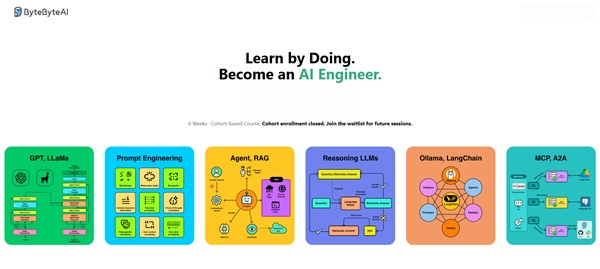[GroupBuy] ByteByte – Learn by Doing Become an AI Engineer
$82.00
- Delivery: You Will Receive A Receipt With Download Link Through Email.
- If you need more proof ofcourse, feel free to chat with me!

Description
Table of Contents
ToggleByteByte stands as a pioneering force in AI education, offering an intensive program that demystifies complex technologies for aspiring engineers. This 6-week cohort course from ByteByte equips learners with practical skills in AI engineering, blending expert instruction with hands-on projects to bridge the gap between theory and real-world application. By focusing on ByteByte‘s innovative approach, participants gain a competitive edge in the fast-evolving AI landscape, making it an essential stepping stone for anyone looking to harness the power of modern AI systems.
ByteByte
ByteByte represents a transformative opportunity in AI education, designed to empower individuals from diverse backgrounds to build and deploy sophisticated AI systems. Drawing from the core principles outlined in the course briefing, this program emphasizes practical, project-based learning that progresses from foundational concepts to advanced applications. With ByteByte‘s structured curriculum, learners can expect a blend of interactive sessions and lifelong access to materials, fostering a community-driven environment that supports both beginners and intermediates.
Evolution of AI Through Project-Based Learning
Project-based learning forms the backbone of ByteByte, transforming abstract AI concepts into tangible skills through six cumulative projects. This method ensures that participants not only grasp the technical aspects but also understand their real-world implications, encouraging a deeper engagement with the material. In my analysis, this approach is particularly effective because it mirrors the iterative nature of AI development in industry settings, where trial and error lead to innovation.
One key insight is how ByteByte simplifies complex topics like Large Language Models (LLMs) by starting with basic overviews and building up to advanced techniques. For instance, the first project involves creating an LLM playground, which covers pre-training elements such as data collection and tokenization. This hands-on experience allows learners to experiment with neural networks and Transformers, fostering a sense of ownership over the technology. Personally, I find this empowering, as it shifts the focus from passive consumption to active creation, potentially reducing the intimidation factor for newcomers.
Moreover, ByteByte integrates post-training methods like Supervised Fine-Tuning (SFT) and Reinforcement Learning from Human Feedback (RLHF), which are crucial for developing safe and efficient AI. By evaluating models through metrics and human assessments, participants learn to iterate on their designs, a process that builds resilience and critical thinking. In a broader context, this could address ethical concerns in AI, such as bias mitigation, by encouraging learners to question and refine their outputs.
Instructor Expertise and Community Support
Ali Aminian, the instructor for ByteByte, brings a wealth of experience that elevates the course beyond standard tutorials. His background as a best-selling author and Stanford affiliate infuses the program with real-world insights, making theoretical discussions more relatable and applicable. This level of expertise ensures that learners receive guidance from someone who has navigated the complexities of AI at leading tech companies.
A standout feature is how ByteByte fosters a supportive peer community, which I believe is often overlooked in AI education. Through live sessions, participants can collaborate, share progress, and troubleshoot together, mirroring professional team dynamics. This not only accelerates learning but also combats the isolation that many face when studying AI independently. From a creative standpoint, envisioning this as a virtual “AI workshop” enhances motivation, as peer interactions can spark innovative ideas and applications.
Additionally, the course’s accessibility—requiring just 4-6 hours per week—makes it ideal for full-time professionals. Aminian’s teaching philosophy, which emphasizes intuitive explanations and beginner-friendly code, allows even those without extensive Python knowledge to dive in. In my personal analysis, this inclusivity could democratize AI education, enabling a wider audience to contribute to the field and drive collective progress.
Curriculum’s Progressive Structure and Innovations
The curriculum in ByteByte is meticulously designed to ensure a logical flow from fundamentals to advanced topics, incorporating elements like Retrieval-Augmented Generation (RAGs) and multi-agent systems. This progression helps learners build confidence while tackling increasingly complex challenges. Creatively, I see this as a “staircase to AI mastery,” where each step reinforces the previous one, leading to a comprehensive understanding.
One innovative aspect is the inclusion of tool calling and multi-step agents, which prepare participants for autonomous AI systems. For example, projects involve workflows like prompt chaining and reflection, teaching learners to create AI that can plan and execute tasks independently. This not only enhances technical skills but also encourages strategic thinking, as users must anticipate potential failures and design safeguards.
Furthermore, ByteByte extends into multi-modal generation, covering techniques like VAE, GANs, Auto-regressive models, and Diffusion models for image and video creation. This forward-thinking addition positions learners at the forefront of AI trends, such as generative art and video synthesis. In my view, mastering these tools could open doors to creative industries, where AI augments human creativity in unprecedented ways.
Ai Playground Stanford
Ai playground stanford emerges as a key theme in ByteByte, highlighting the intersection of academic rigor and practical AI development, inspired by instructor Ali Aminian’s Stanford connections. This aspect of the course draws from Stanford’s tradition of innovative AI research, integrating it into a structured learning path that emphasizes experimentation and deep understanding. By blending ai playground stanford‘s exploratory ethos with ByteByte‘s project-based framework, learners gain exposure to cutting-edge concepts in a supportive environment.
Bridging Academia and Industry in AI Playgrounds
Ai playground stanford serves as a metaphor for the hands-on, experimental spaces that foster AI innovation, much like those at Stanford University. In ByteByte, this translates to projects that allow learners to build and test AI models in a safe, iterative manner. The first project, for instance, creates an AI playground where participants explore LLMs, drawing parallels to Stanford’s research on neural networks and Transformers.
Delving deeper, I appreciate how ByteByte incorporates Stanford-inspired techniques, such as those in reasoning models, to enhance learning outcomes. This approach not only demystifies AI but also encourages ethical considerations, like ensuring model fairness. Personally, this fusion of academia and industry could accelerate career growth, as graduates emerge with credentials akin to those from prestigious programs.
Moreover, the project’s emphasis on evaluation metrics and human feedback echoes Stanford’s focus on responsible AI. By analyzing leaderboards and benchmarks, learners develop a critical eye, which is essential in a field prone to hype. Creatively, I envision ai playground stanford as a virtual lab, where experimentation leads to breakthroughs, making AI accessible and exciting.
Advanced Reasoning and Multi-Modal Applications
Building on ai playground stanford‘s exploratory spirit, ByteByte delves into advanced reasoning through projects like building deep research capabilities. This involves techniques such as Chain-of-Thought prompting and Tree of Thoughts, which are influenced by Stanford’s contributions to cognitive AI models. These methods teach learners to create AI that reasons like humans, a significant leap in capability.
In my analysis, this section stands out for its potential to transform AI from reactive tools to proactive agents. For example, integrating web search and reasoning models allows for agents that can perform tasks autonomously, much like advanced research assistants. This not only boosts efficiency but also raises questions about AI’s role in decision-making, prompting ethical discussions that align with Stanford’s values.
Additionally, ByteByte incorporates multi-modal generation, including VAE and Diffusion models, to expand ai playground stanford into visual and video domains. This creative extension enables learners to generate content beyond text, such as AI-driven art or simulations. From a personal perspective, this could revolutionize fields like entertainment and education, where multi-modal AI creates immersive experiences.
Challenges and Rewards of AI Mastery
While ai playground stanford promotes innovation, ByteByte addresses the challenges of AI engineering head-on, such as managing complexity in multi-agent systems. Learners tackle issues like coordination and scalability, drawing from Stanford’s research on agentic workflows. This prepares them for real-world pitfalls, fostering resilience and adaptability.
One key reward is the sense of accomplishment from mastering these challenges, as seen in projects involving RAGs and tool calling. I find this rewarding because it builds a portfolio of AI applications, enhancing employability. Creatively, think of it as navigating a digital maze, where each success unlocks new possibilities, reflecting the dynamic nature of AI evolution.
Furthermore, the course’s community aspect, inspired by Stanford’s collaborative culture, turns challenges into opportunities for growth. Participants share insights on topics like reflection and orchestration, creating a network that extends beyond the program. In summary, ai playground stanford in ByteByte not only educates but also inspires, making AI a tool for personal and professional empowerment.
To present the key projects from the ByteByte curriculum clearly, here is an overview of the six hands-on projects that form the core of the program:
- Build an LLM Playground: Focuses on LLM foundations, including pre-training topics like data collection and tokenization, as well as post-training methods such as SFT and RLHF.
- Build a Customer Support Chatbot using RAGs: Covers adaptation techniques like PEFT and prompt engineering, with RAGs components including retrieval and generation strategies.
- Build an Ask-the-Web Agent: Explores agent fundamentals, workflows, and multi-step systems, including planning autonomy and multi-agent challenges.
- Build Deep Research Capability: Delves into reasoning LLMs, inference-time techniques like CoT prompting, and training methods such as SFT on reasoning data.
- Build a Multi-modal Generation Agent: Includes image and video generation overview, featuring VAE, GANs, Auto-regressive models, and Diffusion models for creating advanced content.
- Final Integration Project: Synthesizes all concepts, allowing learners to develop a comprehensive AI system that incorporates elements from previous projects.
Conclusion
In conclusion, ByteByte offers a robust pathway to AI mastery, blending practical projects with insights from ai playground stanford, ultimately equipping learners with the skills to navigate and innovate in the AI field. Through its structured curriculum, expert instruction from Ali Aminian, and a supportive community, the course addresses the needs of beginners and intermediates alike, fostering deep understanding and creative application. By emphasizing ethical considerations and real-world relevance, ByteByte not only builds technical proficiency but also inspires a lifelong passion for AI, making it a pivotal step in any engineer’s journey.
Sales Page:_https://bytebyteai.com/
Delivery time: 12 -24hrs after paid
Related products
-
Sale!

John Assaraf Top Programs – Winning The Game Of Money 2024
$1,497.00Original price was: $1,497.00.$39.00Current price is: $39.00. -
Sale!

Dan Petty – Design Full-Time Bundle
$350.00Original price was: $350.00.$14.00Current price is: $14.00. -
Sale!

[GroupBuy] Centerpointe – Life Principles Integration Process
$239.00Original price was: $239.00.$99.00Current price is: $99.00. -
Sale!

[GroupBuy] Rob Lennon and Erica Schneider – The Launch Content Playbook
$449.00Original price was: $449.00.$59.00Current price is: $59.00.

Reviews
There are no reviews yet.